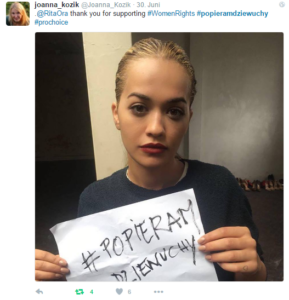Many feminists across Europe have shown solidarity with Polish women following a proposed legislation that would completely ban or extremely limit the right to abortion. What were the reactions in Poland? And is it possible that the issue only is used to divert public attention from other worrying developments in Polish politics?
Abortion rights in Poland
Poland at present has some of the strictest abortion laws in Europe alongside Malta and Ireland. The current law, which was adopted in 1993, bans all terminations except in three cases: when the woman’s life or health is endangered by the continuation of her pregnancy, when the pregnancy is a result of a criminal act (like rape or incest) or when the foetus is seriously malformed. Unlike in other countries where abortion is banned, women in Poland are not subject to a penalty for the illegal termination of a pregnancy. Nevertheless, conducting an illegal abortion is a criminal act. Forcing a woman to carry out an illegal termination of her pregnancy is also a crime.
Recent controversies
Abortion is a controversial topic in current Polish politics. Since the Law and Justice party (PiS) won an absolute majority in Parliament in October 2015, it has waged a war on various institutions associated with a modern liberal democracy. Now activists backed by the Catholic Church want to table a citizens’ bill in Parliament that would allow abortions in only one case – if necessary to save a woman’s life. The Polish Episcopal Conference has issued a statement which encouraged the government and all citizens to support a total ban on abortion. It has been read in churches during the Sunday mass on 3rd of April which caused some of the participants to leave the church, e.g. in Gdańsk.
The petition needs 100.000 signatures to be examined by the Parliament. The bill was drafted by the activists themselves, not by the ruling party.
Thousands of people have attended protests across the country (e.g. in Warsaw, Wrocław, Cracow) against the proposed tightening of the law, with opponents launching their own plan to garner 100.000 signatures supporting a bill liberalising abortion. The counter-petition calls for abortion on demand up to 12 weeks, although even its creators and supporters do not believe that it could be passed. They hope to win the chance of a parliamentary confrontation.
Danuta Wałęsa, Jolanta Kwaśniewska and Anna Komorowska – the three former Polish first ladies – denounced the proposal to tighten the country’s abortion law. Liberal lawmakers called on the current conservative president’s wife Agata Duda to take a stand on the issue, but the president’s office made it clear she would not comment.
The Polish Prime Minister Beata Szydło has expressed her support for an abortion ban, but she has highlighted that this is just her private opinion. She did, however, also add that for the discussion about abortion to be constructive, it needs to include the “reasonable voice” of the Catholic Church.
The influence of the Catholic Church
But why does the Catholic Church has such a big influence in Poland, and how is this connected with the issue of abortion? Before the fall of Communism, the position of the Church was much weaker, and it did not have any actual connection to the government. The laws regarding abortion were also different: Abortion was legal in cases where the woman was experiencing “difficult living conditions”. The interpretation of this law varied in time, from a very restrictive interpretation, to one in where abortion was allowed on request.
After the change of the regime – the Church played an important role in supporting citizens during the Polish fight against Communism – the Church’s role was strengthened, and it stays strong to this day: The overwhelming majority of the country is Catholic, with almost 93% of Polish people declaring to belong to the Catholic faith, and the Catholic Church is included in the public discourse. This even includes issues not related to religion, and it includes the issue of abortion.
The symbol of a Coat Hanger
At present, Polish women are scared and angry, but determined to fight for their reproductive rights. A coat hanger has become a symbol of protests. Thousands of people are marching with them and the Prime Minister also received coat hangers by post. They symbolise the drastic and cruel tools that women will be forced to use to self-terminate a pregnancy when the government forbids legal and safe abortion. Often women put their health and life at risk when trying to induce an abortion themselves: Some use boiling water, some use wires, some use caustic substances and the list goes on.
“#dziewuchydziewuchom” – international support
Polish women are not fighting alone. Marches and protests took places in many places across Europe. Feminists from Brussels, London, Paris, Prague and many more cities are supporting Polish women. Hashtags like #popieramdziewuchy (“I support girls”) or #odzyskacwybor (“Regain the choice”) have become viral. Additional support comes from celebrities like Juliette Binoche, Milla Jovovich, British singer Rita Ora and Polish top model Anja Rubik who have expressed solidarity with the women of Poland.
A diversionary tactic?
Unfortunately, women’s issues (which are controversial topics in Polish politics) are often used to divert public attention from other aspects. Given certain developments in Poland such as the curtailing of the powers of the Constitutional Tribunal, moving the attorney general’s office into the justice ministry or the controversial law restricting ownership rights for farm land (adopted in March 2016), it seems like, once again, women’s issues are being used as a distraction. There are voices that the PiS does not deeply care about banning abortion, but that its leaders are simply adept at manipulation, using the issue of abortion as a smokescreen. When the government follows this path, it transmits the message to society that women’s issues are in fact a substitute topic.
In my opinion, the restriction of the Polish abortion law seems improbable. There are two reasons: Firstly, such a step might further weaken the Polish position on international platform, and secondly, also on a national level, it could cost the ruling party a lot of votes. Sadly, abortion remains a political issue and the actual wellbeing of Polish women is not a main point in the discussion.[:or]Prawa kobiet w Polsce stały się niedawno niezwykle głośnym tematem w europejskich mediach w związku z planowanym znacznym ograniczeniem prawa do aborcji.
Prawo do aborcji w Polsce
Wraz z Maltą i Irlandią, Polska posiada jedno z najbardziej surowych praw aborcyjnych w Europie. Ustawa uchwalona w 1993 r. dopuszcza aborcję jedynie w trzech przypadkach: kiedy życie lub zdrowie matki jest zagrożone, kiedy ciąża jest wynikiem czynu zabronionego (jak zgwałcenia lub kazirodztwa) oraz gdy płód jest poważnie uszkodzony. W przeciwieństwie do innych krajów zakazujących aborcji, w Polsce kobiety które jej dokonują nie podlegają karze. Jednak przeprowadzenie nielegalnej aborcji oraz zmuszanie do jej przeprowadzenia jest przestępstwem.
Ostatnie kontrowersje
Aborcja jest w ostatnim czasie bardzo burzliwie dyskutowana na polskiej scenie politycznej. Odkąd Prawo i Sprawiedliwość uzyskało większość parlamentarną w październiku 2015 r., pozostaje w konflikcie z kilkoma instytucjami stojącymi na straży nowoczesnej i liberalnej demokracji. Obecnie działacze pro-life wsparci siłami Kościoła Katolickiego chcą uchwalenia obywatelskiego projektu ustawy, który zezwalałby na dokonanie aborcji tylko w jednej sytuacji – gdy życie matki jest zagrożone. Konferencja Episkopatu Polski wydała oświadczenie, w którym wezwała władzę oraz obywateli (zarówno wierzących, jak i niewierzących) do poparcia wprowadzenia całkowitego zakazu aborcji w Polsce. List ten odczytany został w kościołach podczas niedzielnej myszy 3 kwietnia, co spowodowało opuszczenie budynku przez grupy wiernych, np.: w Gdańsku.
Aby projekt ustawy trafił do Parlamentu wymagane jest zebranie 100.000 podpisów. Autorem dokumentu nie jest jednak Prawo i Sprawiedliwość, jest on dziełem działaczy społecznych.
Tysiące ludzi protestuje przeciwko zaostrzeniu ustawy aborcyjnej w całym kraju, m. in. w Warszawie, Wrocławiu czy Krakowie. Ponadto, stworzyli oni obywatelski projekt ustawy liberalizującej prawo aborcyjne, m. in. która zezwalałaby na dokonanie aborcji na życzenie do 12. tygodnia ciąży. Jednakże nawet twórcy i zwolennicy projektu, nie mają nadziei na jego uchwalenie. Ich celem jest zachęcenie do konfrontacji obu projektów obywatelskich.
Danuta Wałęsa, Jolanta Kwaśniewska and Anna Komorowska – trzy byłe polskie Pierwsze Damy wydały oświadczenie, w którym potępiły proponowane zaostrzenie ustawy aborcyjnej. Środowiska liberalne wzywały aktualną Pierwszą Damę – Agatę Dudę do zajęcia stanowiska w sprawie. Rzecznik Prezydenta Andrzeja Dudy, Marek Magierowski, podał iż Pierwsza Dama nie będzie wypowiadać się w tej kwestii.
Premiera, Beata Szydło, wyraziła swoje poparcie dla zaostrzenia ustawy dotyczącej aborcji. Zaznaczyła jednak, iż jest to jedynie jej prywatna opinia. Emocje wzbudził fakt, iż dodała, że rozsądny głos Episkopatu jest niezbędny, aby dyskusja dotycząca aborcji toczyła się w sposób merytoryczny.
Zgodnie z przeprowadzonym przez GUS w 2015 r. badaniem, prawie 93% Polaków uważa się za katolików. Polski Kościół Katolicki jest istotną częścią dyskursu publicznego i zajmuje stanowisko także w sprawach nie związanych z wiarą. Instytucja ta darzona jest szacunkiem i jej pozycja niewątpliwie jest bardzo silna. Przed upadkiem komunizmu aborcja dopuszczalna była w sytuacji, gdy kobieta była w ,,trudnej sytuacji życiowej”. Interpretacja tego warunku zmieniała się w czasie – od bardzo surowej, do faktycznej aborcji na życzenie. W tamtym czasie rola Kościół nie był związany z władzą, jednak odegrał istotną rolę w polskiej walce o wolność. Po zmianie ustroju rola Kościoła znacznie wzrosła.
Symboliczny wieszak
Obecna sytuacja przeraża i denerwuje Polki, są one jednak zdeterminowane by walczyć o swoje prawa. Wieszak stał się symbolem protestujących. Tysiące ludzi maszeruje z nimi w dłoniach, część wysyła je pocztą do gabinetu Premiery. Wieszaki mają znaczenie symboliczne. Ukazują do jak niebezpiecznych i drastycznych metod muszą uciekać się kobiety, którym państwo zakazuje bezpiecznej i legalnej aborcji. Niejednokrotnie kobiety narażają na niebezpieczeństwo swoje życie i zdrowie. Niektóre używają wrzątku, niektóre drutów, inne substancji żrących. Lista nie ma końca.
“#dziewuchydziewuchom” – międzynarodowe wsparcie
Polki nie walczą same. Marsze i protesty odbywają się w wielu miastach całej Europy. Feministki z Brukseli, Londynu, Paryża, Pragi i wielu innych miast wspierają Polki. Hashtagi jak #popieramdziewuchy czy #odzyskacwybor opanowały Internet. Dodatkowe wsparcie płynie także od gwiazd, takich jak Juliette Binoche, Milla Jovovich czy polska top modelka Anja Rubik,które także solidaryzują się z polskimi kobietami.
Zasłona dymna?
Niestety, prawa kobiet (będące w Polsce niewątpliwie kwestią kontrowersyjną) są często wykorzystywane, by odwrócić uwagę opinii publicznej od innych spraw. Biorąc pod uwagę niedawny skandal wokół Trybunału Konstytucyjnego, przyporządkowanie stanowiska Prokuratora Generalnego Ministerstwu Sprawiedliwości czy kontrowersyjną ustawę o gruntach rolnych, można przypuszczać, iż także teraz, sprawy kobiet są używane, by rozproszyć społeczną uwagę. Można usłyszeć głosy, że PiS nie jest wcale bardzo zainteresowany kwestiami dotyczącymi aborcji. Jest to jedynie zabieg manipulacyjny, zasłona dymna. Kiedy polskie władze podejmują takie kroki uczą społeczeństwo, że prawa kobiet są faktycznie tematem zastępczym. Zaczynają być one postrzegane jako nieistotne i niegodne prawdziwej uwagi.
Moim zdaniem do zaostrzenia polskiego prawa aborcyjnego nie dojdzie. Niezbyt obecnie pozytywny wizerunek Polski na arenie międzynarodowej zostałby wyraźnie pogorszony. Także w kraju, podjęcie tak drastycznego kroku mogłoby kosztować PiS poparcie zbyt wielu wyborców. Niestety, aborcja pozostaje kwestią polityczną, a dobro Polek nie jest tutaj istotnym argumentem w dyskusji.




![Sexual Violence in Croatia – Seksualno nasilje u Hrvatskoj [EN/HR]](https://www.youngfeminist.eu/wp-content/uploads/2015/11/2016-02-11T235953Z_2113641152_GF10000305276_RTRMADP_3_POPE-MEXICO-150x150.jpg)
[…] Solidarity with Polish Women – Abortion Rights in Poland […]
[…] campagnes, demonstraties, solidariteit van andere vrouwen en een petitie onder de slogan Redt de Vrouwen, liepen echter stuk op de politieke […]